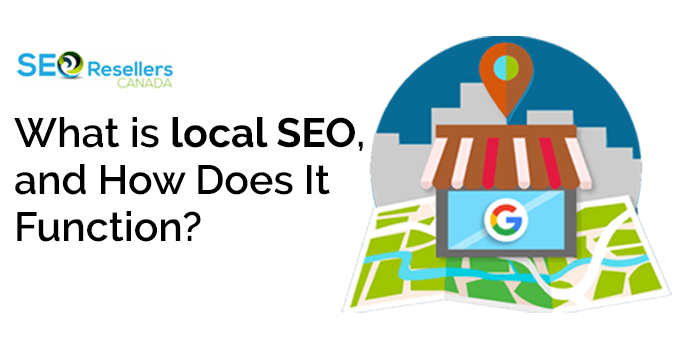There are more than 1.94 billion websites that engage business owners in a relentless battle to capture the interest of targeted web users.
The term ‘web traffic’ essentially refers to the visitors to a website. Web traffic and organic search rankings are important for every business. Higher numbers mean they are driving sales and ensuring profitability. When a brand seeks enhanced digital presence, it makes a significant difference to hire a link-building company. Web traffic is categorized into two main types: organic and inorganic.
Organic traffic is the gold standard in the digital world. It refers to the visitors who find your website naturally, without any paid promotions or advertisements. These users discover your site through search engines. They come across your website due to its relevance and the quality of your content. Therefore, understanding organic traffic is crucial for any business owner who aims for a strong online presence.
Let’s find out the difference between organic and inorganic traffic. Let’s explore how to craft an online strategy based on how the approach of organic and inorganic traffic operates.
Feel free to navigate through the different sections using the table of contents below to gain a comprehensive understanding of this topic.
1- What is organic traffic?
Organic traffic is the number of visitors that visit directly through search engine results without any paid promotions. It is the natural flow of visitors driven by the website’s alignment with specific search terms.
Websites are optimized for relevant industry keywords or terms. When someone searches for products or services, the website appears in the top search results organically.
These listings are not influenced by paid advertising but are determined by search engines based on the website’s credibility and relevance to the search query. Organic traffic essentially embodies the genuine interest of users. These visitors naturally gravitate towards a website due to its authentic appeal, which is often achieved through the efforts of a white-label SEO company.
1.1- Gamechanger stats about organic traffic
Let’s understand some useful numbers that can help you craft better online marketing strategies:
- 64% of marketers prioritize enhancing their organic online presence
- Refreshing old blog posts can boost organic search traffic by 115%
- The first five organic search results capture 69.2% of all clicks; the sixth to tenth results get 3.5%
- High organic search rankings improve conversion rates, making it easier to convert leads into sales
- Websites in top industry searches gain 96% of clicks on search engine result pages
- Approximately 42% of revenues across sectors come from organic traffic
- Organic results outperform social media, driving 310% more web traffic
- Major search engines (Google, Bing, YouTube, Yahoo) account for 72.3% of web traffic
- First-page Google results contain an average of 1,960 words
- Organic search has a close rate of 15.2% compared to 1.5% for outbound leads
- Top spenders heavily rely on organic search to gather information
2- How to Get Organic Search Traffic with Google Analytics?

Google Analytics is a tool for web analytics tool. It is free of cost and can be used to analyze the web traffic. It is like having a personal detective for your website. It helps you dig deep into who visits your site.
These insights are like gold for your business because they help you understand your visitors better. Use this data to make your marketing strategies cooler and offer a better experience to your audience. Fifty million websites are using Google Analytics to make their online marketing even better.
Now let’s focus on ‘How to track organic search traffic in Google Analytics?’
Step #1 Open your website’s dashboard in Google Analytics. Look for the Acquisition option in the main menu on the left.
Step #2 Click on Campaigns and select Organic Keywords from the drop down menu. This shows you the traffic from search engines like Google. You can see the percentage of visitors coming from organic searches.
Step #3 Change the date range to see how your organic traffic has changed over time. This helps you track if your website’s organic traffic has improved, worsened, or stayed the same.
Step #4 In the ‘Organic Keywords’ section, change the primary dimension from ‘Organic Keywords’ to ‘Source.’ This gives you complete data about organic traffic from different search engines.
Step #5 Switch from ‘Source’ to ‘Landing Page’ to see which pages on your website attract the most organic traffic.
Step #6 Explore the ‘Other’ option, where you can analyze your website’s organic traffic data from various dimensions. You can select a country or a city to get geographic data online. This helps you understand the source of organic traffic.
Step #7 Google Analytics allows you to add a secondary dimension, making your results more specific. For example, you can find out if people in your target cities are using mobile devices or desktop computers to search for your products and services.
It’s fascinating to note the rapid growth in mobile device usage for organic search visits. Utilize Google Analytics with SEO outsourcing to open up a world of valuable insights related to your organic search traffic. This tool allows you to generate a plethora of useful organic search traffic reports. It enables you to gather and analyze data based on sources, countries, landing pages, and much more.
3- Organic Traffic vs. Inorganic Traffic—What’s the Difference?
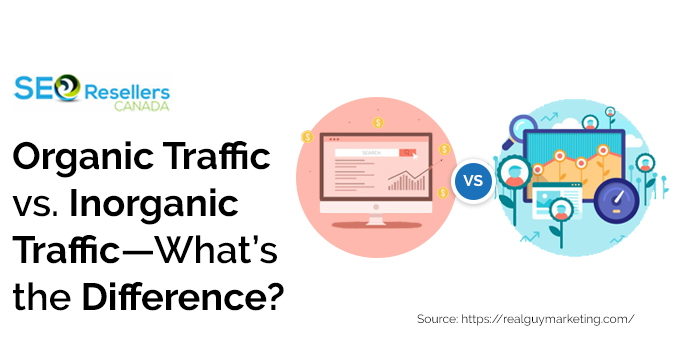
Organic traffic stems from organic search results. It appears below ads in search engine results after a user enters a query. These results are entirely based on the page’s content and quality. It means your organic traffic consists of people who found your business through natural and unpaid searches.
On the other hand, inorganic search is paid search. It focuses on paid strategies like PPC management services and paid social media ads. The fundamental distinction between organic and inorganic search traffic lies here. Businesses investing in organic traffic don’t have to pay for clicks, unlike those opting for paid search methods to generate leads.
When you purchase website traffic through pay-per-click advertising, you pay the search engine every time someone clicks on your website ad. A common example of PPC advertising is via the Google Display Network.
Apart from the fundamental differences, let’s find out why it is important to invest in organic search.
3.1- Cost
The cost factor is a primary benefit of organic search over paid search. PPC ads ensure visibility as they place your company’s links and ads in front of potential site visitors. However, they come with a hefty price tag, and the expenses for click-throughs accumulate over time.
The cost per click for organic searches is zero. All you need to do is consistently apply effective SEO strategies to generate high-quality traffic cost-effectively. It is an approach for maximizing your Organic search ROI intelligently. The more effort you invest in enhancing your organic search traffic, the higher your website will rank in search results.
3.2- Reliability
Users tend to trust organic results more because they have a long-lasting presence on search engine result pages compared to paid results.
Research indicates that 30% of internet users prefer the first organic result displayed for their search query over paid results. So, focus on organic traffic and incorporate effective SEO consulting strategies to strengthen your company’s online presence.
3.3- Increased conversion ratio
Leverage your organic search, and you can easily boost your business and improve the sales conversion ratio. When a potential customer searches for products or services you offer, turn them into buyers.
You increase your chances of being found by your target audience. This means your leads are more likely to click on your site. It will lead to conversions and increased sales.
Paid search is good for online businesses. It delivers quick results and enhances your website’s visibility. You can create and launch a paid search campaign within days.
Ideally, a balanced approach involving both organic and inorganic searches gets the best outcomes. Crafting a strategy that incorporates both methods allows you to benefit from the strengths of each.
For instance, when your site appears in top organic searches, it lends credibility to your inorganic SEO efforts. This dual approach signals to Google that your site deserves a higher rank on search engine result pages.
4- How do you increase organic search traffic?
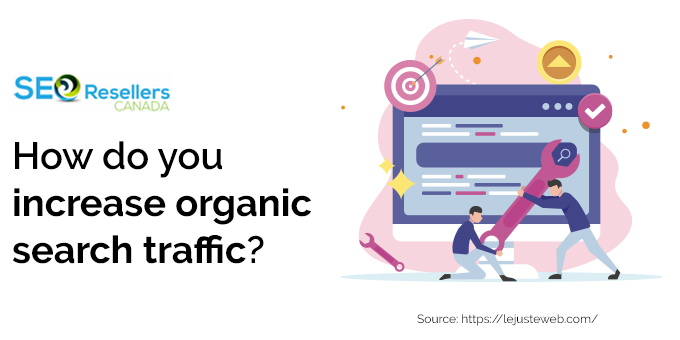
You need Search Engine Optimization (SEO) to enhance organic traffic. A specialist in Kelowna SEO can guide you in improving your organic search CTR. SEO experts can enhance your website’s position in organic searches related to your industry and the most frequently searched keywords.
Our SEO experts implement the following organic search best practices to yield the best outcomes.
4.1- Invest in Organic search keyword research
- Before diving into optimization, conduct thorough keyword research to understand what terms your audience uses.
- Focus on optimizing low-competition keywords, especially long-tail phrases, which are more specific and relevant to users’ search queries.
- Targeting specific phrases, like “auto shop in Victoria, British Columbia,” can enhance visibility and attract genuine leads.
4.2- Ensure Your Site is Search Engine-Friendly
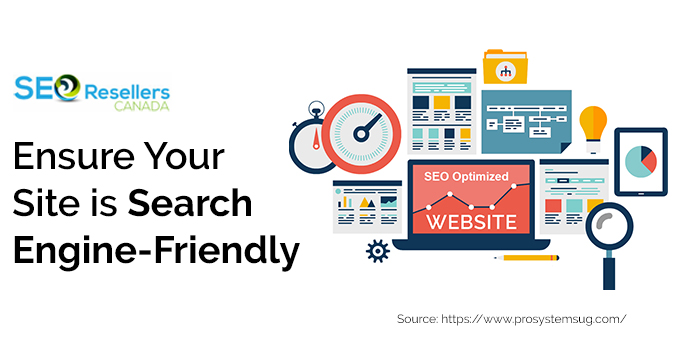
- Make your website search engine-friendly by incorporating essential meta details such as meta titles, descriptions, and URLs.
- These details communicate to search engines about the content and purpose of your web pages, enhancing their visibility in organic searches.
4.3- Organic search content marketing
- Quality content is paramount; create high-quality, keyword-rich content that answers users’ queries effectively.
- Avoid mediocre content; focus on delivering valuable information and engaging material that establishes your brand’s credibility.
4.4- Organic search link building
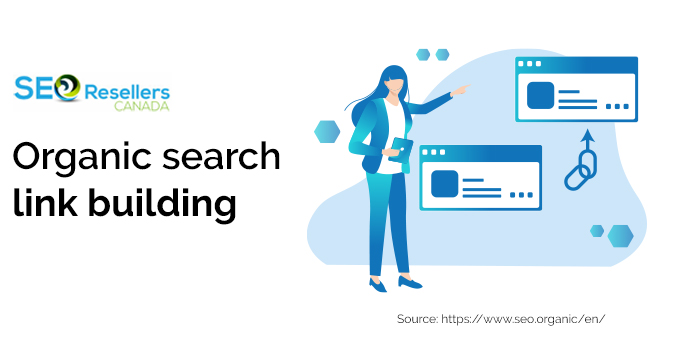
- Build backlinks from credible websites; these inbound links act as votes of trust, improving your site’s organic rankings.
- Encourage clients, partners, suppliers, and industry influencers to link to your website, enhancing your site’s authority and credibility.
4.5- Follow Ethical Practices
Adhere to ethical SEO practices and avoid Blackhat techniques. A Victoria SEO company like SEO Resellers Canada can help you get a higher organic rank. Stay away from cheap link building, exact match anchor texts, and low-quality or plagiarized content. This could lead to Google penalties.
4.6- Social media solutions

- Establish a robust social media presence on platforms like Facebook, Twitter, LinkedIn, and Instagram.
- Integrate social share buttons on your website to encourage users to share your content, increasing its reach and improving your industry rankings.
4.7- Utilize Organic search metrics
- Utilize tools like Google Analytics to gather data and metrics about your organic traffic sources and keywords.
- Analyze this information to refine your content, choose the right keywords, and optimize your SEO strategies for better organic search results.
4.8- Provide Quality Information and Customer Experience

- Offer more than just products or services; provide quality information, advice, and exceptional customer experience.
- Gain the trust of your audience by addressing their needs and concerns, guiding them through their purchase journey, and ensuring a positive interaction with your website.
5- Conclusion
The market is competitive; therefore, enduring connections with your audience are paramount. Put continuous efforts into top organic search rankings. Hire a digital marketing agency, as they can help you with quality content and strategic SEO techniques.
Surpass competitors and secure high rankings in the industry with organic search results. Spearhead your way through the competition and establish a strong online presence.
Editor’s Note: This post was originally published on December 27, 2019, and has been completely revamped and updated for accuracy and comprehensiveness.














